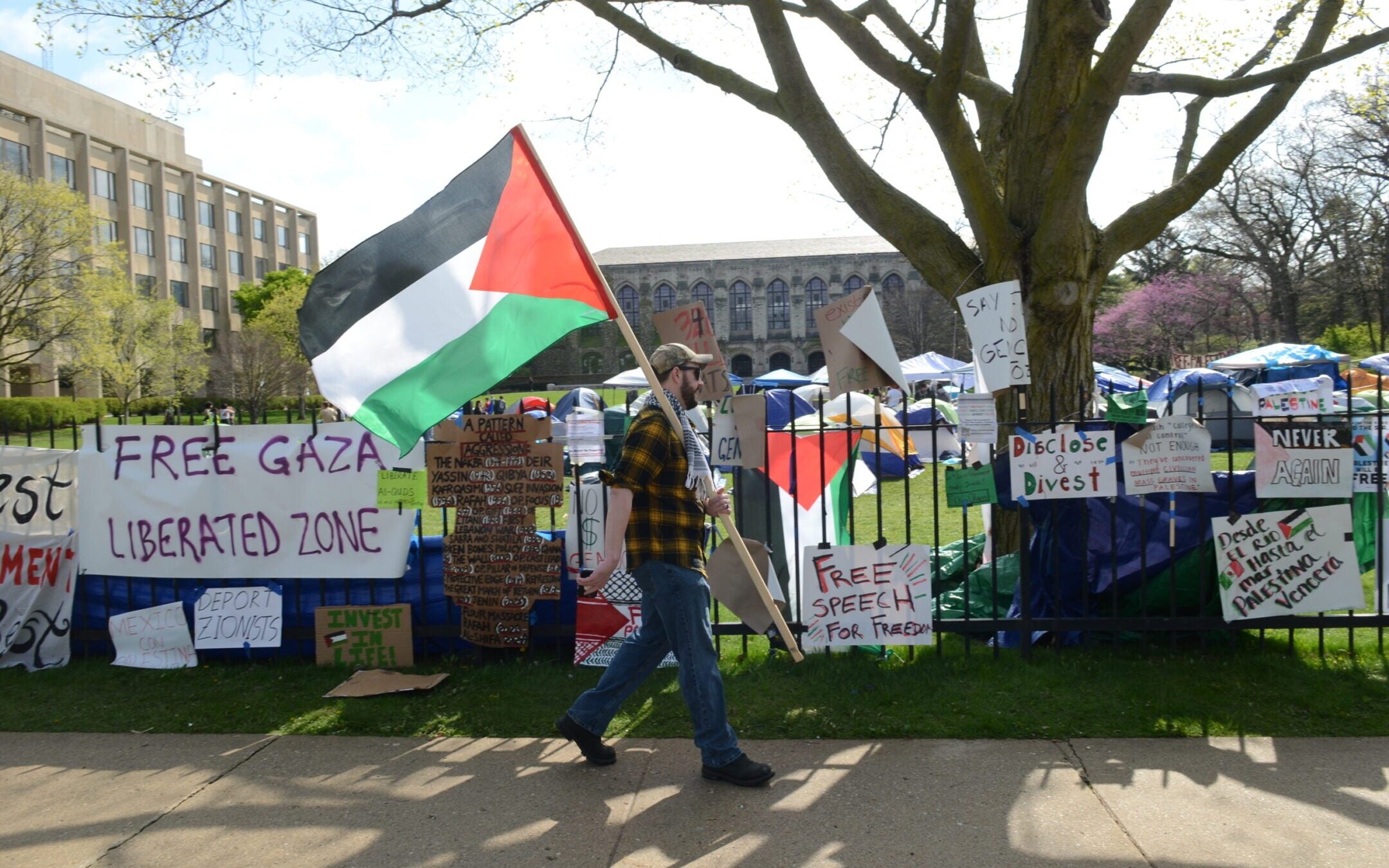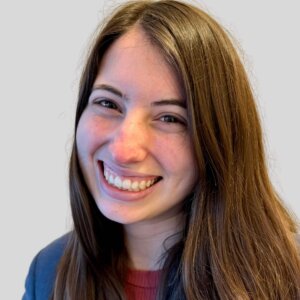‘What is antisemitism?’ At Northwestern, a class on the subject resists simple answers
In Professor David Shyovitz’s class, students debate the topic that’s dominating the national conversation

Banners hanging from the fence outside Northwestern University during a pro-Palestinian protest in April 2024. Photo by Jacek Boczarski/Anadolu via Getty Images
At Northwestern University, a class about what is — and isn’t — antisemitism doesn’t shy away from taboo questions.
“Is it antisemitic to call a Jewish person a pig?” the course description asks. “To advocate for boycotts against Israel? To work to criminalize infant circumcision, or kosher slaughter?”
The class does not promise answers, but rather historical and scholarly frameworks to wrestle with the subject. That’s the premise of “What is Antisemitism?” — a history class taught by professor David Shyovitz amid national debate over that very question.

Shyovitz, who once considered becoming a rabbi and now researches Jewish-Christian relations in the Middle Ages, developed the class in fall 2020, well before pro-Palestinian encampments on college campuses across the country made national news. But at Northwestern, a fierce debate about antisemitism was already taking place.
In October 2020, student protesters marched to then University President Morton Schapiro’s house demanding that he abolish campus police. “Piggy Morty,” the protesters chanted.
Schapiro responded in an email to students and staff, saying the “piggy” chant came “dangerously close to a longstanding trope against observant Jews like myself,” alluding to a medieval antisemitic trope associating Jews with pigs. Protesters, however, said they were merely using “piggy” as slang for police. (Full disclosure: I attended Northwestern when this was taking place and graduated in 2023.)
“I thought, this is not really being discussed in a very academic or historically literate way,” Shyovitz said in an interview with the Forward. “We should be having better conversations about this, based on some actual knowledge and scholarship and expertise.”
Shyovitz, director of Northwestern’s Crown Family Center for Jewish and Israel Studies, saw a classroom as the ideal forum for those discussions. He taught the first iteration of “What is Antisemitism?” in winter 2024 — just a few months after the attacks of Oct. 7, at a moment when debates over antisemitism were intensifying.
Those discussions often devolved into debating definitions. The widely used — but controversial — International Holocaust Remembrance Alliance (IHRA) definition classifies most anti-Zionism as antisemitic. Alternative frameworks, like the Jerusalem Declaration and Nexus Document, define antisemitism more narrowly and allow for a broader swath of Israel criticism.
But relying on gut instinct alone to determine what is and isn’t antisemitic is equally unsatisfying, Shyovitz said, likening it to Supreme Court Justice Potter Stewart’s famous line about pornography: “I know it when I see it.”
Shyovitz largely circumvents those definitional debates in the first half of the class by examining antisemitism through a historical lens, while the latter half focuses on contemporary antisemitism.
“What we try to do is say, ‘Where did this term come from?’” Shyovitz said. “How has it been used by historical actors, but also by scholars to try to make sense of phenomena in the past? And then, when is it helpful? When isn’t it helpful?”
For example, Shyovitz teaches, the word “antisemitism” was coined in 1879 by German journalist Wilhelm Marr, who sought to classify Jews as an inferior “semitic” race. So when discussing “antisemitism” in the Middle Ages, it’s notable that the term was not how anyone in that time period would have referred to the phenomenon.
Labelling pre-modern Jew hatred as antisemitism can import the modern associations that that word has accrued today, Shyovitz said.
“There has never been a kind of a unanimous sense that this is a term that means a single thing and can be easily grasped,” Shyovitz said, “It’s kind of been a contentious topic from the get go.”
Contentious, too, on Northwestern’s campus. Last spring, then-university president Michael Schill faced intense scrutiny over his decision in 2024 to negotiate with pro-Palestinian protesters in an encampment. The Anti-Defamation League, StandWithUs and the Brandeis Center called for Schill’s resignation, writing that Schill, who is Jewish, had “capitulated to hatred and bigotry.”
Schill resigned in September, citing “painful challenges” that Northwestern had faced during his tenure.
Later that month, hundreds of Northwestern students were barred from registering for classes after refusing to watch an antisemitism training video. Protesters said the video, which stated that most forms of anti-Zionism are antisemitic, ostracized anti-Zionist Jews.
Those controversies occurred after Shyovitz first taught the course, so he’s curious how class discussions will unfold when he teaches it for the second time this fall. The course culminates in a debate where students are randomly assigned to defend either the Jerusalem Declaration or the IHRA definition, the latter of which was formally adopted by Northwestern as part of its code of conduct in February.
Still, campus politics are not the course’s primary focus.
“The history that they’re studying actually has very clear stakes for present day policy questions,” Shyovitz said. “But if all we did was debate Northwestern politics in class, I think that would be a real wasted opportunity.”
For Northwestern senior Maria Chebli, who grew up in Beirut, taking the class last year helped her gain a more nuanced perspective on discourse surrounding antisemitism. Though she often disagreed with her classmates, she also formed friendships with them — a dynamic she credited to Shyovitz, who she said fostered an environment where students felt free to respectfully challenge one another.
“The class was quite refreshing, because everyone was very open to discussion,” Chebli said. “I don’t know if I would have had these conversations with the same people outside the classroom, and if I had, whether they would have been that fruitful.”
Shyovitz said the class has been one of the most fulfilling of his teaching career. At a time when discussions about antisemitism are often ill-informed, he said, “these students really were able to get to the crux of some of these issues in a much more productive way.”

















